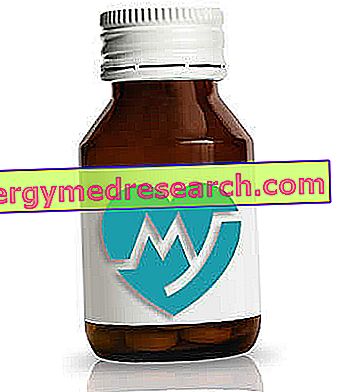Definition
Also known by the term "diaphragmatic hernia", the hiatal hernia designates a rather common and annoying condition, in which a portion of the stomach ascends through the esophageal diaphragmatic hiatus, creating damage. The small hiatal hernia can go unnoticed and not create any disturbance; conversely, consistent hiatal hernia requires surgical intervention.
To understand ... the esophageal diaphragmatic hiatus is a hole in the diaphragm that under physiological conditions allows the passage of the esophagus through the diaphragm
Causes
The triggering cause of hiatal hernia has not yet been clearly identified; only hypothesis, in which it seems that an abdominal trauma, an excessive congenital weakness of the gastroesophageal tract, an opening of the excessive esophageal hiatus or an esophageal canal too short, can somehow be involved in the appearance of the hiatal hernia. Pregnancy could also be a risk factor for this condition.
Symptoms
As can be guessed, the most felt problem in the context of severe hiatal hernia is the ascent of gastric contents into the esophagus, which in turn is responsible for circumscribed burning, back pain and regurgitation. Other symptoms include: aerophagia, anorexia, bitter mouth, digestive and swallowing difficulties, belching, sore throat, nausea and tracheitis.
- Complications: asthma, dyspnea, cough
Diet and Nutrition
The information on Iatal Hernias - Drugs for the Treatment of Hernia Hernias do not intend to replace the direct relationship between health professional and patient. Always consult your physician and / or specialist before taking Ernia Iatale - Drugs for the Treatment of Hernia.
drugs
Patients who do not complain of any typical symptoms of hiatal hernia should not be too alarmed: it is no coincidence, in fact, that mild hiatal hernia is causally diagnosed, with a non-specific medical check-up. Different speech must be made for severe hiatal hernia: the characteristic symptoms, such as heartburn and belching, could degenerate and become complicated in real digestive difficulties, breathing difficulties and even induce asthma. In such situations medical consultation is essential.
There is no drug aimed at treating hiatal hernia; however, the administration of drugs for the treatment of heartburn is particularly useful for calming the symptoms.
The only completely conclusive therapeutic strategy for hiatal hernia is surgery, reserved however for a rather small number of patients (emergency situations, allergic subjects to proton pump inhibitors): in general, the surgical repair of the Hiatal hernia is often combined with an operation to treat gastroesophageal reflux disease:
- Narrowing of the opening of the esophageal hiatus
- Repositioning of the portion of the stomach returned to the esophageal canal
- Reconstruction of the esophageal hiatus (in case of excessive weakening)
- Removal of the hernia
NOTES: the hiatal hernia, in the long run, can generate an unpleasant feeling of oppression in the chest, which can easily be confused with angina pectoris or with a myocardial infarction: also for this reason the early diagnosis is very important.
Antacids : indicated to relieve heartburn caused by hiatal hernia. The administration of these drugs ensures rapid relief.
- Calcium carbonate (eg Cacit, Metocal, Recal): indicatively, it is recommended to take a dose of active variable from 1250 to 3750 mg per day, divided into 2-4 doses during 24 hours. When calcium carbonate is taken for long periods, besides causing swelling, it can lead to constipation.
- Sodium bicarbonate or NaHCO 3 (eg Citrosodina): this substance acts quickly neutralizing acids, but has unpleasant side effects (alkalinization of urine, swelling, hypersodemia). The use of sodium bicarbonate should not be a common practice, but rather can be used to temporarily reduce the symptoms related to hiatal hernia, after consulting a doctor.
- Aluminum Hydroxide and Magnesium Hydroxide (eg Maalox): the two active ingredients present in this product are specially associated, since they have opposite side effects: magnesium hydroxide is a laxative, aluminum hydroxide is responsible for constipation. Take 2-4 tablets per day (500-1500 mg) with plenty of water, 20-60 minutes before meals and before bedtime.
Proton pump inhibitor drugs : very useful to lighten the symptoms that accompany the hiatal hernia, since their therapeutic activity is exercised by blocking the production of gastric acid, thus leaving enough time for the esophagus tissues to repair the damage . By acting directly on the proton pump, these drugs are able to block the production of histamine, gastrin and acetylcholine.
- Lansoprazole (eg. Pergastid, Lomevel, Lansox): it is recommended to take one 15 mg tablet once a day, before the main meal, and to continue the therapy for at least 4 weeks.
- Omeprazole (eg Antra, Nansen): start therapy by taking a 20 mg tablet per day (before the main meal, for 4-8 weeks). When necessary, it is possible to increase the dosage to 40 mg / day, as described by the doctor. In some cases, maintenance therapy (10-20 mg / day) is required for a longer period.
H2 blockers (histamine H2 receptor antagonists) : these are antisecretory drugs, indicated to reduce the production of hydrochloric acid, thus placating the retro sternal burning perceived in the context of hiatal hernia.
- Nizatidine (eg. Nizax, Cronizat, Zanizal): the dose of 150 mg of active ingredient is recommended twice a day. For children who have already reached the age of one and suffer from gastroesophageal reflux disease, it is recommended to administer 10 mg / kg per day, divided into two doses, for 8 weeks. If the child is aged between 4 and 11, the recommended dose is 6 mg / kg per day, divided into two doses.
- Ranitidine (eg. Zantac, Ranibloc): administer one 150 mg tablet (orally) twice daily, or 50 mg intravenously or intramuscularly every 6-8 hours (adult dose).
- Cimetidine (eg Ulis, Biomag, Tagamet): we recommend oral administration of the drug, one tablet (400 mg) 4 times a day for 4-8 weeks. It is also possible to administer the drug intramuscularly (200 mg every 4-6 hours) or slow intravenous (200-400 mg in at least 5 minutes, every 4-6 hours).
- Famotidine (eg Famotidine EG, Myliconacid): parenteral administration of 20 mg of active every 6 hours is recommended. Alternatively, a dose of 100 mg once a day (or 60 mg twice a day) can be administered orally; continue the therapy for up to one year.
In the case of a minor hiatus hernia, surgery is not necessary; however, it is strongly advised to put into practice some simple food tricks, useful for alleviating symptoms:
- Extend the meal into more snacks during the day
- Follow a low-calorie diet, especially for overweight patients
- Limit spicy foods (responsible for increased gastric acidity)
- Limit hyperlipidic foods (food delays in the stomach)
- Drink lots of fluids
- Do not wear tight clothes often
- Take anti-inflammatory drugs NSAIDs only when necessary: in fact, the administration of these active ingredients could exacerbate the symptoms of hiatal hernia.



